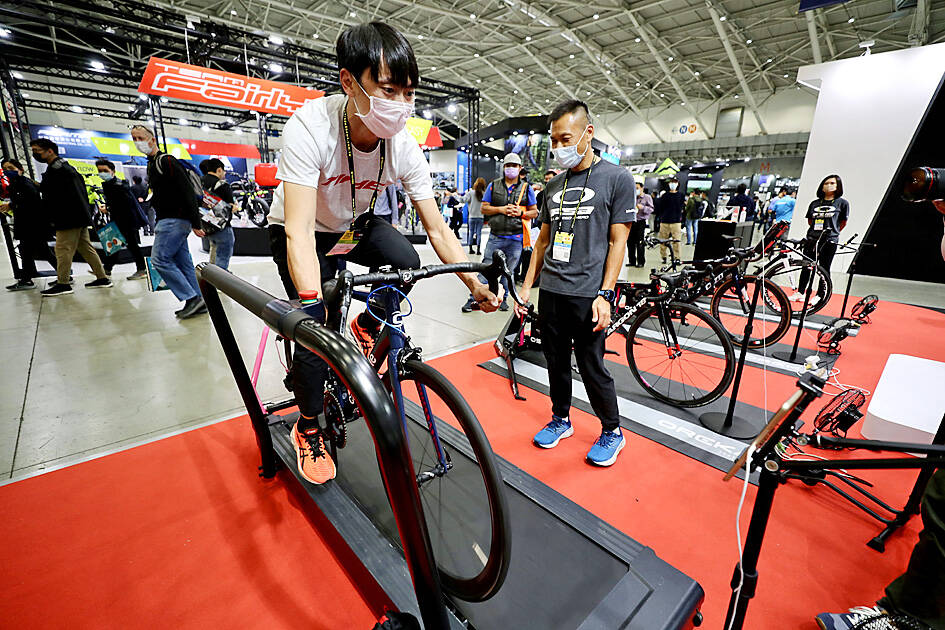Taiwan’s exports of bicycles and bicycle parts last year increased 23.11 percent annually to US$6.15 billion from US$4.99 billion the previous year, with an average annual increase of 8.2 percent over the past 10 years, the Ministry of Economic Affairs said yesterday, citing the latest customs statistics.
Bicycle parts accounted for 48 percent of the industry’s total exports, rising 26.65 percent year-on-year to US$2.95 billion, with outbound shipments of bicycle parts growing 12.7 percent annually on average in the past 10 years, the data showed.
Exports of traditional bicycles totaled US$1.63 billion last year, up 22.4 percent from 2021, but their share of the industry’s total exports fell to 26.6 percent from 26.7 percent in 2021 and from 67.5 percent in 2012 amid growing uptake of bicycle-sharing systems, the ministry said.

Photo: Ritchie B. Tongo, EPA-EFE
Exports of electric bicycles last year rose 17.7 percent annually to US$1.56 billion. The value of outbound shipments grew 57.5 percent since 2012, due mainly to a rapid growth in European and US markets, as well as the products having higher selling prices, the ministry said.
Electric bicycles accounted for 25.4 percent of the industry’s overall exports last year, compared with 26.6 percent in 2021.
The US, the Netherlands, Germany, the UK and China were the top five destinations for Taiwanese bicycles and bicycle parts last year, accounting for 63.6 percent of the industry’s total exports.
The US continued to be the largest export market last year for traditional bicycle manufacturers, and the Netherlands remained the largest market for electric bicycles, while most of bicycle-related shipments to Germany were bicycle parts.
The ministry said Taiwan’s electric bicycles have increased their market share in the US, the EU and China, thanks to more Taiwanese firms moving production of high-end models back home amid US-China trade tensions.
However, Taiwan faces rising competition from Cambodia, as the Southeast Asian country has benefited from better tariff terms for bicycle exports to Europe and the US, which have led several European and US brands to set up production bases there, the ministry said.
The EU’s imports of bicycles from Cambodia exceeded those from Taiwan for the first time in 2021, it added.

Sweeping policy changes under US Secretary of Health and Human Services Robert F. Kennedy Jr are having a chilling effect on vaccine makers as anti-vaccine rhetoric has turned into concrete changes in inoculation schedules and recommendations, investors and executives said. The administration of US President Donald Trump has in the past year upended vaccine recommendations, with the country last month ending its longstanding guidance that all children receive inoculations against flu, hepatitis A and other diseases. The unprecedented changes have led to diminished vaccine usage, hurt the investment case for some biotechs, and created a drag that would likely dent revenues and

Global semiconductor stocks advanced yesterday, as comments by Nvidia Corp chief executive officer Jensen Huang (黃仁勳) at Davos, Switzerland, helped reinforce investor enthusiasm for artificial intelligence (AI). Samsung Electronics Co gained as much as 5 percent to an all-time high, helping drive South Korea’s benchmark KOSPI above 5,000 for the first time. That came after the Philadelphia Semiconductor Index rose more than 3 percent to a fresh record on Wednesday, with a boost from Nvidia. The gains came amid broad risk-on trade after US President Donald Trump withdrew his threat of tariffs on some European nations over backing for Greenland. Huang further

Nvidia Corp’s GB300 platform is expected to account for 70 to 80 percent of global artificial intelligence (AI) server rack shipments this year, while adoption of its next-generation Vera Rubin 200 platform is to gradually gain momentum after the third quarter of the year, TrendForce Corp (集邦科技) said. Servers based on Nvidia’s GB300 chips entered mass production last quarter and they are expected to become the mainstay models for Taiwanese server manufacturers this year, Trendforce analyst Frank Kung (龔明德) said in an interview. This year is expected to be a breakout year for AI servers based on a variety of chips, as

HSBC Bank Taiwan Ltd (匯豐台灣商銀) and the Taiwan High Prosecutors Office recently signed a memorandum of understanding (MOU) to enhance cooperation on the suspicious transaction analysis mechanism. This landmark agreement makes HSBC the first foreign bank in Taiwan to establish such a partnership with the High Prosecutors Office, underscoring its commitment to active anti-fraud initiatives, financial inclusion, and the “Treating Customers Fairly” principle. Through this deep public-private collaboration, both parties aim to co-create a secure financial ecosystem via early warning detection and precise fraud prevention technologies. At the signing ceremony, HSBC Taiwan CEO and head of banking Adam Chen (陳志堅)